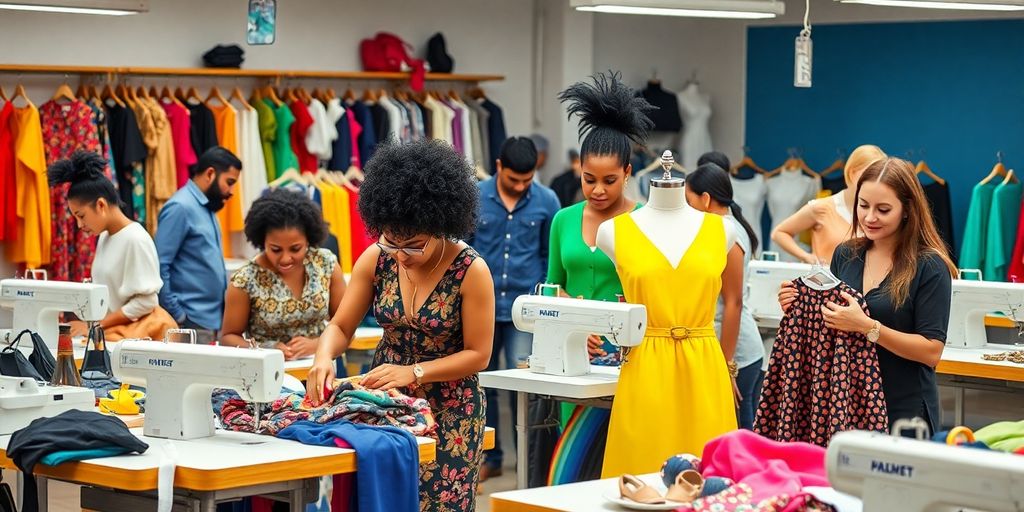If you’re thinking about a career in the fashion world, you might want to consider the exciting field of fashion supply chain jobs. This area is all about managing how products move from the design stage to the store shelves, and it’s a crucial part of the fashion industry. Whether you’re interested in logistics, sourcing, or inventory management, there are plenty of opportunities to make your mark. Let’s break down what you need to know about these roles and how to get started in this stylish career path.
Key Takeaways
- Fashion supply chain jobs are essential for managing product flow from design to retail.
- Roles in logistics, sourcing, and inventory are diverse and in demand.
- Strong analytical and communication skills are crucial for success in this field.
- Relevant education and internships can help you break into the fashion supply chain.
- Staying updated on industry trends and technology is key to advancing your career.
Understanding Fashion Supply Chain Jobs

Overview of the Fashion Supply Chain
The fashion supply chain is a complex network that spans from raw material sourcing to the moment a customer purchases a garment. It involves numerous stages, including design, manufacturing, distribution, and retail. Each step is interconnected, and efficiency in one area can significantly impact the entire chain. Think of it like this: a delay in fabric delivery can halt production, leading to late shipments and dissatisfied customers. Understanding this end-to-end process is essential for anyone looking to work in this field. The fashion industry relies on a well-oiled machine to deliver the latest trends.
Key Roles in the Supply Chain
The fashion supply chain offers a wide array of job opportunities, each with its unique responsibilities. Here are a few examples:
- Sourcing Managers: Responsible for finding and securing the best raw materials at competitive prices.
- Production Planners: They oversee the manufacturing process, ensuring products are made on time and within budget.
- Logistics Coordinators: They manage the movement of goods from factories to distribution centers and ultimately to stores.
- Inventory Managers: They track stock levels and ensure the right amount of product is available to meet demand.
These roles require different skill sets, but they all contribute to the overall success of the supply chain. It’s not just about moving clothes; it’s about optimizing every step to reduce costs and improve efficiency.
Importance of Supply Chain Management
Effective supply chain management is critical for fashion brands to stay competitive. In today’s fast-paced market, consumers expect high-quality products, quick delivery, and affordable prices. A well-managed supply chain can help brands achieve these goals by reducing lead times, minimizing waste, and improving responsiveness to changing consumer demands. Supply chain management also plays a vital role in sustainability efforts, ensuring ethical sourcing and environmentally friendly practices. Consider the impact of inventory management on reducing waste and improving profitability.
Diverse Career Paths in Fashion Supply Chain
The fashion supply chain isn’t just about moving clothes from factories to stores; it’s a complex network with a wide array of job opportunities. If you’re looking for a career that blends creativity with logistics, this could be the perfect field for you. Let’s explore some of the exciting paths you can take.
Logistics and Distribution Roles
Logistics and distribution are the backbone of the fashion industry. These roles ensure that products get where they need to be, when they need to be there. Think of it as the circulatory system of fashion. A fashion supply chain relies on these roles to function.
- Logistics Coordinator: Manages the movement of goods, coordinating with carriers and warehouses.
- Distribution Manager: Oversees the distribution network, ensuring efficient delivery to retailers and customers.
- Transportation Planner: Optimizes transportation routes and methods to reduce costs and improve delivery times.
Sourcing and Procurement Positions
Sourcing and procurement are all about finding the best materials and suppliers at the best prices. It’s a critical function that directly impacts product quality and profitability. It’s about finding the right partners to bring a designer’s vision to life. Ethical sourcing is becoming increasingly important.
- Sourcing Manager: Identifies and evaluates potential suppliers, negotiating contracts and ensuring quality standards.
- Procurement Specialist: Manages the purchasing process, from placing orders to tracking deliveries.
- Fabric Buyer: Specializes in sourcing fabrics and textiles, staying up-to-date on the latest trends and innovations.
Inventory Management Opportunities
Inventory management is about balancing supply and demand, ensuring that the right products are available at the right time, without tying up too much capital. Effective inventory management can make or break a fashion business. It’s a delicate dance of forecasting, planning, and execution.
- Inventory Planner: Forecasts demand and develops inventory plans to meet customer needs.
- Warehouse Manager: Oversees warehouse operations, ensuring efficient storage and retrieval of goods.
- Demand Planner: Analyzes sales data and market trends to predict future demand and adjust inventory levels accordingly.
The fashion supply chain offers a diverse range of career paths, each with its unique challenges and rewards. Whether you’re passionate about logistics, sourcing, or inventory management, there’s a role for you in this dynamic industry.
Skills Required for Fashion Supply Chain Careers
Fashion supply chain careers demand a mix of hard and soft skills to navigate the complexities of the industry. It’s not just about knowing the latest trends; it’s about making sure those trends can actually reach consumers efficiently and ethically. Let’s break down some of the key skills you’ll need.
Analytical and Problem-Solving Skills
In the fashion supply chain, things rarely go exactly as planned. That’s why strong analytical skills are so important. You need to be able to look at data, identify problems, and come up with effective solutions. This might involve anything from figuring out why a shipment is delayed to optimizing inventory levels to reduce waste. Being able to think critically and solve problems on the fly is a skill that will set you apart. For example, you might need to analyze sales data to predict future demand or troubleshoot a disruption in the supply of raw materials. These skills are essential for effective supply chain management.
Communication and Collaboration
Communication is key. You’ll be working with people from all over the world, from suppliers and manufacturers to distributors and retailers. Being able to communicate clearly and effectively is essential for building strong relationships and ensuring that everyone is on the same page. This includes written, verbal, and even visual communication skills. Collaboration is also crucial. The fashion supply chain is a complex network, and you’ll need to be able to work effectively with others to achieve common goals. This means being a good team player, being able to compromise, and being able to build consensus.
Technical Proficiency in Supply Chain Software
Technology plays a big role in modern supply chains. You’ll need to be comfortable using various software programs to manage inventory, track shipments, and analyze data. This might include:
- Enterprise Resource Planning (ERP) systems
- Warehouse Management Systems (WMS)
- Transportation Management Systems (TMS)
- Supply Chain Planning (SCP) software
Familiarity with data analytics tools is also a plus. The more comfortable you are with technology, the more effective you’ll be in your role. Many companies also use specialized software for specific tasks, such as product lifecycle management (PLM) or sourcing. Staying up-to-date with the latest technology trends is important for career advancement.
Educational Background for Supply Chain Jobs
Relevant Degrees and Certifications
So, you want to work in the fashion supply chain? That’s awesome! You might be wondering what kind of education you need. Well, there’s no single path, but some degrees and certifications can really give you a leg up. A bachelor’s degree in supply chain management, logistics, or a related field like business administration or engineering is a solid start. These programs give you a broad understanding of how supply chains work, from sourcing materials to getting products to customers.
- Business Administration
- Industrial Engineering
- Logistics
Don’t feel like you have to go to fashion school. A lot of the skills you need, like data analysis and project management, can be learned in other programs. Plus, you can always take some online courses or workshops to learn more about the fashion industry specifically.
Internship Opportunities in Fashion
Okay, so you’ve got the classroom knowledge, but how do you get your foot in the door? Internships are HUGE. They’re a chance to see how things actually work in the real world and make some connections. Look for internships with fashion brands, retailers, or logistics companies. You might be surprised at the variety of roles available, from helping with inventory management to assisting with sourcing.
- Research companies that offer internships in your area.
- Tailor your resume and cover letter to highlight relevant skills and experience.
- Don’t be afraid to reach out to companies directly, even if they don’t have advertised internships.
Continuing Education and Professional Development
The fashion industry is always changing, so learning never stops! Even after you land a job, it’s important to keep your skills sharp and stay up-to-date on the latest trends and technologies. Consider pursuing certifications in areas like lean manufacturing or project management. These can show employers that you’re committed to professional growth. Also, keep an eye out for workshops, conferences, and online courses that can help you expand your knowledge and network with other professionals in the field. The NYC fashion industry is constantly evolving, so continuous learning is key to staying competitive.
Emerging Trends in Fashion Supply Chain
Sustainability in Fashion Supply Chains
Sustainability is no longer a niche concept; it’s a core expectation. Consumers are increasingly aware of the environmental and social impact of their clothing choices. This is pushing brands to adopt more sustainable practices throughout their supply chains.
- Using eco-friendly materials like organic cotton, recycled polyester, and innovative fabrics made from waste.
- Reducing water consumption and pollution in textile production.
- Ensuring fair labor practices and safe working conditions in factories.
Fashion brands are under pressure to be transparent about their supply chains, tracing materials from origin to finished product. Certifications like GOTS (Global Organic Textile Standard) and Fair Trade are becoming increasingly important for building consumer trust.
Impact of Technology on Supply Chain Efficiency
Technology is revolutionizing every aspect of the fashion supply chain. From design to distribution, digital tools are improving efficiency, reducing waste, and enabling faster response times. For example, fashion e-commerce is booming, and supply chains need to keep up.
- AI-powered forecasting tools are helping brands predict demand more accurately, minimizing overstocking and markdowns.
- 3D printing is enabling faster prototyping and customized production.
- Blockchain technology is enhancing supply chain transparency and traceability.
Globalization and Its Effects on Fashion Supply Chains
Globalization has always been a defining feature of the fashion industry, but its effects are constantly evolving. While it offers access to diverse resources and markets, it also presents challenges related to ethical sourcing, environmental impact, and supply chain resilience. The rise of fast fashion has only exacerbated these issues.
- Increased complexity in managing global supply networks.
- Greater scrutiny of labor practices and environmental standards in developing countries.
- The need for more agile and responsive supply chains to adapt to changing consumer demands and geopolitical events.
| Trend | Impact |
|---|---|
| Nearshoring | Reduced lead times, lower transportation costs, improved responsiveness |
| Diversification | Mitigates risks associated with relying on a single supplier or region |
Networking and Job Search Strategies
Landing your dream job in the fashion supply chain isn’t just about having the right skills; it’s also about who you know and how you present yourself. Let’s explore some effective strategies to build your network and nail that job search.
Building Connections in the Fashion Industry
Networking is essential in the fashion world. It’s about creating genuine relationships that can open doors you never knew existed. Don’t just collect business cards; nurture those connections.
- Attend industry events: Fashion weeks, trade shows, and conferences are goldmines for meeting people. Don’t be shy – introduce yourself to speakers, designers, and fellow attendees.
- Join professional organizations: Groups like the American Apparel & Footwear Association (AAFA) offer networking opportunities and resources.
- Use LinkedIn strategically: Connect with people in roles you admire, and participate in industry-related groups. A strong LinkedIn profile is your digital handshake.
Networking isn’t just about getting a job; it’s about building a community. Offer help, share insights, and be a valuable contact yourself. This approach will make people remember you and want to connect.
Utilizing Online Job Platforms
Online job platforms are a key tool in your job search. But it’s not enough to just upload your resume and hope for the best. You need to be strategic. Tailor your resume and cover letter to each position, highlighting the skills and experiences that are most relevant. Use keywords from the job description to help your application get noticed. Consider taking short online courses to boost your resume.
Here’s a quick guide to some popular platforms:
| Platform | Focus |
|---|---|
| Professional networking and job postings | |
| Indeed | Wide range of job postings |
| FashionUnited | Fashion-specific job board |
| Business of Fashion | High-end fashion jobs |
Attending Fashion Industry Events
Fashion industry events are more than just glamorous parties; they’re prime opportunities to learn, network, and potentially find your next job. Research events that align with your interests and career goals. Prepare an elevator pitch – a concise and compelling summary of your skills and experience. Don’t forget to follow up with the people you meet after the event. These events can help you find fashion supply chain jobs.
- Fashion Weeks: While often exclusive, some events are open to industry professionals.
- Trade Shows: Excellent for meeting suppliers, manufacturers, and retailers.
- Industry Conferences: Offer educational sessions and networking opportunities.
The Future of Fashion Supply Chain Jobs

The fashion industry is always changing, and so are the jobs within its supply chain. It’s not just about getting clothes from factories to stores anymore. It’s about being smart, sustainable, and quick. Let’s look at what the future holds for these roles.
Growth Projections for Supply Chain Roles
The demand for skilled supply chain professionals in fashion is expected to grow significantly. As e-commerce continues its rise, the need for efficient logistics, sourcing, and inventory management becomes even more critical. Think about it: every online order needs to be processed, packed, and shipped, creating a ton of opportunities. The rise of fashion e-commerce is creating a lot of jobs.
- Increased demand for logistics coordinators.
- More need for sustainability managers.
- Greater opportunities for data analysts.
Adapting to Industry Changes
To stay relevant, supply chain professionals need to be adaptable. Technology is changing how things are done, and new trends are emerging all the time. Those who can learn quickly and embrace change will be the most successful.
The fashion industry is becoming more global and interconnected. Supply chain professionals need to understand international trade, regulations, and cultural differences. This includes being able to work with suppliers and partners from all over the world.
Career Advancement Opportunities
There are plenty of ways to move up in the fashion supply chain world. With experience and the right skills, you can go from an entry-level position to a leadership role. It’s all about showing initiative, taking on new challenges, and continuously learning.
- Supply Chain Manager
- Director of Operations
- Vice President of Supply Chain
Wrapping Up Your Fashion Supply Chain Journey
As we wrap up our exploration of fashion supply chain jobs, it’s clear that this field offers a variety of exciting opportunities. Whether you’re drawn to e-commerce, logistics, or sustainability, there’s a place for you in this vibrant industry. The fashion world is always changing, and with it, the demand for skilled professionals is growing. So, if you’re passionate about fashion and ready to dive into the supply chain side of things, now is a great time to start. Keep learning, stay curious, and don’t hesitate to reach out to others in the field. Your stylish career could be just around the corner!
Frequently Asked Questions
What are fashion supply chain jobs?
Fashion supply chain jobs involve managing how clothes and accessories are made and delivered to stores. This includes everything from getting materials to shipping the final products.
What roles can I find in the fashion supply chain?
There are many roles in the fashion supply chain, including logistics, sourcing, and inventory management. Each job plays a part in making sure products are available for customers.
Why is supply chain management important in fashion?
Supply chain management is crucial in fashion because it helps brands stay organized, reduce costs, and respond quickly to trends. It ensures that the right products are in the right place at the right time.
What skills do I need for a job in fashion supply chain?
To work in fashion supply chain, you need strong problem-solving skills, good communication, and the ability to use supply chain software. Being organized and detail-oriented is also very helpful.
What education do I need for a career in fashion supply chain?
You can start with a degree in business, fashion, or logistics. Internships in the fashion industry can also give you valuable experience and help you learn more about the field.
What trends are shaping the future of fashion supply chains?
Some trends include a focus on sustainability, the use of technology to improve efficiency, and the impact of globalization. These changes are making the fashion supply chain more innovative and responsive.

Peyman Khosravani is a global blockchain and digital transformation expert with a passion for marketing, futuristic ideas, analytics insights, startup businesses, and effective communications. He has extensive experience in blockchain and DeFi projects and is committed to using technology to bring justice and fairness to society and promote freedom. Peyman has worked with international organizations to improve digital transformation strategies and data-gathering strategies that help identify customer touchpoints and sources of data that tell the story of what is happening. With his expertise in blockchain, digital transformation, marketing, analytics insights, startup businesses, and effective communications, Peyman is dedicated to helping businesses succeed in the digital age. He believes that technology can be used as a tool for positive change in the world.











